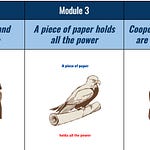Greetings friends,
In our last episode, I talked with Dr. Patrick Crawford and Dr. Christine Davis – and while we looked back a bit, it was interesting to observe how Dr. Crawford - while thinking about the innovation of Blended Schools could not help but be future-focused and learner-focused.
It was great fun to invite him back - along with Dr. Tom Butler, the Executive Director of Appalachia IU8 to talk about the potential of Artificial Intelligence (AI). Dr. Butler is a very future-focused, learner-focused leader. Many of you have heard us refer to Dr. Butlers’ newsletter, the Learner-Centered Leader - on this podcast. His thoughtful leadership has been the foundation for the growth of the World of Learning and his support and tough questions help to guide us.
Our discussion on Artificial Intelligence (AI) in Education had two distinct moments - one, the need to consider history. Dr. Butler started the conversation by drawing from the longer history of innovation in education (and beyond), including the use of tools like chalkboards, pencils, overhead projectors, mimeograph machines, copiers, TV - you get the idea. The second big idea was – we need to be grounded in purpose.
AI, like any other tool, is meant to enhance, rather than replace, human teaching. In fact, as you listen in, you will hear that we need to be mindful of how much more human and connected it can make our teaching and learning.
Both of these amazing leaders gave us quite a bit of insight. Lots to think about.
Here are the takeaways from our conversation:
Historical context: Rather than be driven by fear or by chasing a shiny object, we explored the historical innovations in education and how AI can enhance student engagement and focus, echoing Dewey's philosophy that the learning process can only actually be useful when children are provided with sufficient learning opportunities to connect their prior experience with the current knowledge.
Tailoring learning experiences: our discussion focused on making learning experiences radically learner-centered and purposeful. To the first point - how can we include hands-on experiences?
Dynamic approach: Emphasis on shifting away from one-teacher lesson plans towards personalized, engaging teaching methods.
Leveraging AI: we highlighted the role of AI and its potential to support creating an ideal learning experience by freeing up time for educators to individualize instruction. Free up teachers (and leaders) from mundane tasks.
A balanced perspective: in the conversation, we cautioned against a dystopian view or even a utopian view of what AI can do in education – advocating for an understanding of both its potential and limitations.
Resources to Continue Learning:
Next Phase of AI in Education at the U.S. Department of Education, Office of Ed. Tech, Feb. 8, 2024
AI and the Future of Teaching and Learning: Insights and Recommendations, Office of Ed. Tech, May 2023
As always, if you can’t find a teacher or just want to talk creative solutions - reach out! You can find lots of great options in our catalog (but don’t limit yourself)!
Have a great week,
Pat












